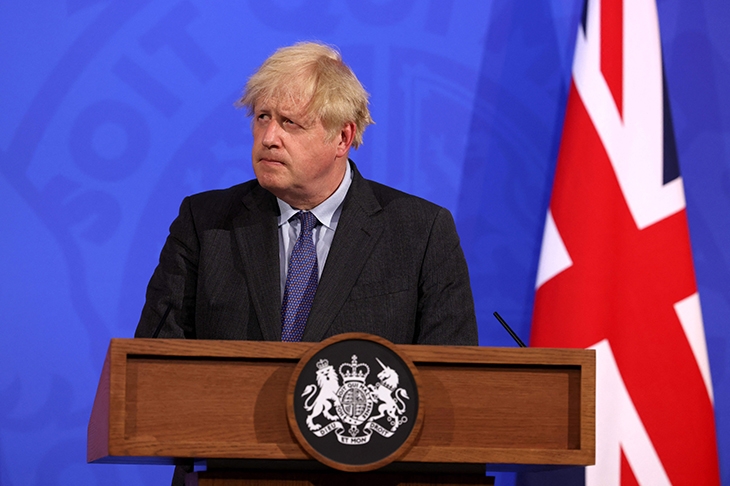Boris Johnson’s predecessor was destroyed by her inability to meet deadlines. Theresa May extended the Brexit transition period so many times that her party eventually turned against her. Johnson, who was notorious for pushing deadlines when he was a journalist, is now discovering the political problem with missing dates. The Prime Minister may still be flying high in the polls but if he cannot meet the new date for ending restrictions — 19 July — then his own MPs will lose faith in his ability to restore normality.
The whole point of the government’s staggeringly long lockdown timetable, announced back in February, was to set an achievable deadline. The theory was that by 21 June a high vaccination rate would mean there was no question of hospitals being overwhelmed. The roadmap would offer certainty — a final end to intermittent lockdowns. Just last week, the hospitality sector was preparing to operate at full capacity, placing orders and hiring staff. Even ministers were sending out invitations to their book launches and summer parties.
Those events are off. After cases of the Indian variant soared, scientists warned that the peak of hospitalisations could rival the first wave. So Johnson announced a four-week delay to the roadmap, with the promise of a review two weeks in. He says that, this time, the date really will be a ‘terminus’.
Ministers are at pains to appear optimistic. Michael Gove has said that only something ‘unprecedented and remarkable’ could derail the latest roadmap. But as recently as last week he claimed that, if he were a betting man, he’d put money on lockdown ending on 21 June. The irony is that millions of businesses and restaurants have bet money on precisely that.

Polling suggests that the public supports the continuation of restrictions. But in parliament it is a different matter. The Prime Minister is under fire from all sides. On Monday, Lindsay Hoyle, the Speaker, accused the government of misleading the House by announcing the delay in a press conference rather than on the Commons floor. Misleading the House is traditionally a cause for ministerial resignation.
Labour has been quick to go on the attack. The party, as ever, supports the lockdown, but blames the need for a delay on Johnson’s incompetence, citing his failure to ban flights from India once the ‘variant of concern’ was first identified. Yet of all the Prime Minister’s current critics, it’s his own MPs who ought to worry him the most.
Ever since the first lockdown, there has been grumbling from Tory backbenchers, often to little avail. Keir Starmer’s support for the restrictions makes rebellion useless. The frequency with which members of the party’s Covid Recovery Group object means that their complaints are not taken particularly seriously. This time, however, the Whips have been struck by how many party loyalists and members on the payroll have been in touch to let their unhappiness be known. ‘Everyone is seething,’ says one member of the 2019 intake. ‘It’s not just the usual suspects this time.’
‘Everyone is seething,’ says one member of the 2019 intake. ‘It’s not just the usual suspects this time’
While cabinet collective responsibility is broadly holding, there are hints of slippage. ‘I don’t support a delay. Few of us do,’ says a senior minister. ‘But it’s not up to me.’ Some are even edging off message publicly. The Leader of the House, Jacob Rees-Mogg, warned on a podcast this week that ‘you can’t run a society just to stop the hospitals being full’.
What worries the Tory dissenters most isn’t the economic or social damage done by a four-week delay — most can live with that, particularly if it means normality by the school holidays. The worry is that once the end of lockdown has been delayed, it is easier to do it again. The Sage documents suggest that in a few weeks’ time the number of hospitalisations will be nearing its peak. ‘If the number of cases and hospitalisations are worse, does Boris really have the nerve to unlock then?’ asks one Tory MP.
It’s still possible that the data will allow the Prime Minister to reopen in two weeks’ time. But even if there is further easing, scientists may want to bring back more rules in the autumn when seasonal viruses start to circulate. ‘If they are acting like this in June, we are going to be locked down again by October,’ says one adviser to the government. A former minister adds: ‘Anyone who thinks it’s “just another few weeks and we’ll see this thing off” is simply not following the logic of what delay means here. I fear this is a zero-Covid strategy.’
In the meantime, Health Secretary Matt Hancock has been going into battle with Red Wall Tories from the 2019 intake on the health WhatsApp group. ‘It’s a very polite debate with Hancock posting graphs of hospitalisations and MPs replying with graphs of low deaths,’ says one MP. This perhaps explains why No. 10 is talking as if the removal of restrictions on 19 July is certain. It is to keep the troops in order.
Civil servants have started to work on the decriminalisation of Covid rules. Johnson hinted at this in Monday’s press conference when he suggested some people may choose to continue with ‘sensible’ behaviour, like keeping social distancing. Masks are likely to remain mandatory for public transport. There is also a revival of interest in an immuno-privilege system, which would give freedoms to fully vaccinated people (foreign holidays, for example) that would not be afforded to others. ‘It’s the global trend,’ says one figure involved in the plans.
For as long as Labour MPs support lockdown, the Tory rebels know their cause is doomed. But they can defeat the government in other places. ‘Look at planning. That’s where a lot of my colleagues plan to take it out on the government,’ says one southern MP. MPs believe there is little chance of Johnson’s planning reform bill making it through. Tories who have been canvassing in Chesham and Amersham ahead of the by-election report that the Lib Dems’ hyperbolic warnings about what the reforms would do to the constituency will lead to a reduced Tory majority there.
Johnson’s majority of 80 means he remains in a powerful position. But his critics are growing in number. He may find that after lockdown ends he is left with an unhappy, disappointed and recalcitrant party willing for the right moment to take its revenge.







Comments